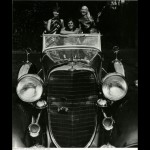“When I received the invitation…for some Parsons students to produce a 2015 version of Women of ’69, Unboxed, I was intrigued. Once I saw the documentary, I was hooked. The film presents how the lives of some of those ‘Women of ‘69’ unfolded, how their dreams and aspirations were realized, or changed. It speaks to women everywhere who were part of a generation whose lives were shifting so significantly, offering them greater opportunities and more agency. After all, the Skidmore women were graduating at a time of enormous social and political upheaval in America, and they ‘wanted to be free’ – they wanted to be ‘un-boxed.’”
Hazel Clark, Professor & Research Chair of Fashion, Parsons School of Design, The New School
“The 370 women who graduated from Skidmore College…in 1969 skipped a traditional yearbook for something innovative: a ‘Yearbox’…” Focusing on 19 of the women, the film explores the tumultuous times of their college days and their lives as mature women.”
Christine Dolen, The Miami Herald
“The photos are indeed remarkable… The interviews are terrific, and some of the musings about turning 65 are inspirational… But the real legacy of the film is opening up that ‘Yearbox…’ The freedoms these women fought for — that they had to even fight for things like the right to drink alcohol on campus — is the lesson of the film.”
Next Avenue
“The great value of Women of ’69, Unboxed, is its emphasis upon how college-educated women navigated their way through a social landscape of shifting expectations. The ‘second wave’ of feminism and the ways women have dealt with the changing nature of their role in society…is extremely important. And it is filled with tension. Many of these women—and viewers who will watch the documentary—were and are on a literal and figurative journey.”
Tom Lewis, Documentarian, and Professor of English, Skidmore College
“The story…is compelling and necessary. While we have many histories of women’s political and legislative victories in the 1960s, we have yet to look more carefully at the impact on individual women. I especially like the idea of using the device of the yearbook. Yearbooks typically symbolize life transitions, but at Skidmore, the Class of 1969 redefined this symbol and created an ‘alternative’ record of college life. Their ‘Yearbox’ became a potent symbol of who they were and sought to become during this period of social upheaval.”
Susan M. Yohn, Professor & Chair, History Department, Hofstra University
“…an important documentary that will help us understand the cultural, social, and political possibilities and tensions that emerged during the 1960s and early 1970s, using the experience of women of the Skidmore graduating class as a prism through which to sec larger and important questions of gender, class, race, and ethnicity in one of the most tumultuous and epochal periods in the nation’s history.”
Stephen Brier, Professor, Ph.D. Program in Urban Education, and Senior Academic Technology Officer, The Graduate Center, CUNY
“…excited by (the documentary’s) current questions and framework.”
Beth Bailey, Professor of History, Temple University



